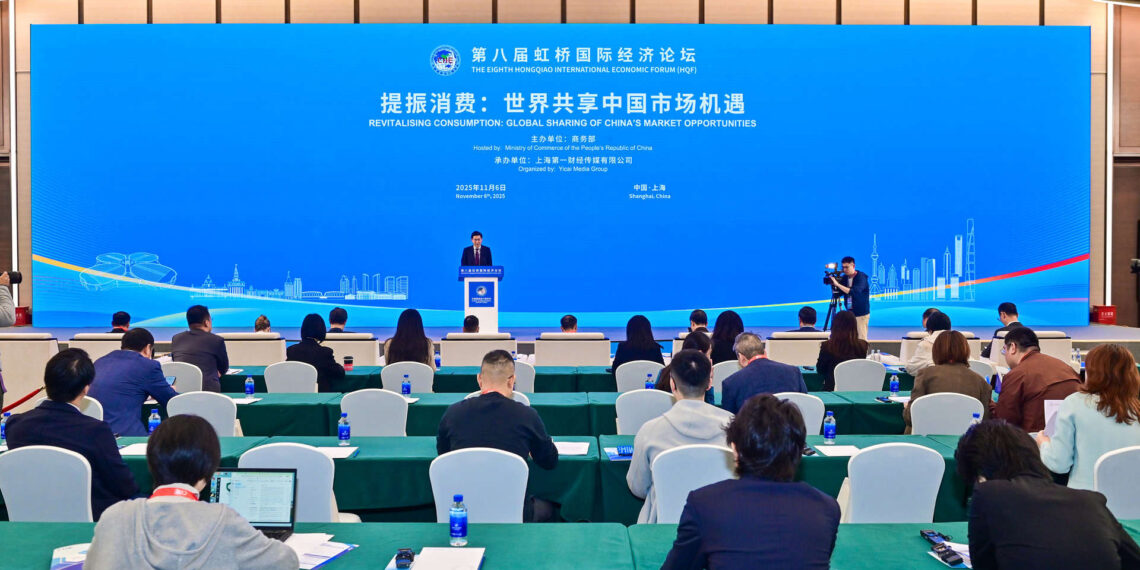Select Language:
Global leaders gathered to explore how China’s extensive market opportunities could serve as a catalyst for global economic growth. Discussions centered on policy coordination, modernizing consumption, and transforming the service industry through artificial intelligence at a sub-forum of the 8th Hongqiao International Economic Forum.
Organized by China’s commerce ministry and hosted by a prominent media group, the session titled “Revitalizing Consumption: Global Sharing of China’s Market Opportunities” featured distinguished scholars and executives from companies such as Intel and JD.com, who convened in Shanghai yesterday.
The Chinese government has been actively laying groundwork for higher-quality consumption. Recently, it released a policy document emphasizing expanding high-quality goods and services, developing international consumption hubs, and protecting consumer rights—all setting the tone for the discussions.
During the main session, Liu Yuanchun, president of Shanghai University of Finance and Economics, proposed a series of measures to boost consumer spending. He emphasized that restoring consumption in the short term depends on improving incomes, assets, and consumer confidence.
Liu also highlighted the importance of balancing short-term adjustments with medium-term structural reforms. He advocated for promoting durable goods and innovative consumption patterns while strengthening the social safety net through income distribution reforms, all tailored to China’s unique circumstances.
AI as a Growth Driver
Michael Spence, a Nobel Prize-winning economist and emeritus professor at Stanford’s Graduate School of Business, forecasted that China’s economy would reach a higher income level and a more balanced demand structure within five years.
“The challenge for policymakers is to find bridges that facilitate this transition from investment-driven growth to increased domestic services and household consumption,” Spence explained.
He also pointed out the transformative potential of artificial intelligence. “The service sector is expected not only to grow but to operate more effectively,” he said, noting that similar shifts are likely across various sectors. “We’ll see AI revolutionize legal services, customer support, and innovative retail models, creating entirely new ways to deliver these services,” Spence added.
He emphasized the long-term nature of this transformation, indicating that while the full picture isn’t yet clear, enough insights suggest a significant, ongoing evolution that will reinforce the service economy and hasten structural transition.
On restoring spending momentum, Spence stressed the importance of rebuilding confidence within households and private-sector investments. “This involves clear communication about the roles of government, private enterprises, and state-owned sectors to ensure everyone is aligned,” he said.
Refining Policies
Lu Ming, a professor at Shanghai Jiao Tong University, noted that China’s 15th Five-Year Plan should prioritize structural shifts, turning consumption into a new growth area, especially emphasizing services.
Lu recommended measures such as stabilizing the economy and household incomes, optimizing holidays and work schedules, improving urban infrastructures, expanding service consumption scenarios, and relaxing restrictive policies to tap into consumer potential.
Sarah Kemp, vice president of a major tech firm, underscored technology’s role in fueling consumption growth. She explained that AI-powered personal computers could trigger a new wave of device upgrades over the next decade, transforming these devices from passive tools into active productivity partners and boosting consumer demand.
During a roundtable, industry representatives from JD.com, Tapestry International, and Lincoln China exchanged insights on evolving market trends, tech-driven supply-demand models, and emerging business opportunities over the next five years.
Yang Yudong, chief editor of the organizing media group, commented that amid global economic restructuring, China’s vast market and openness are bringing stability to the world economy.
“Turning China’s consumption potential into shared global benefits and positioning Chinese consumers as key drivers of global growth are critical questions for the coming years,” Yang concluded.






